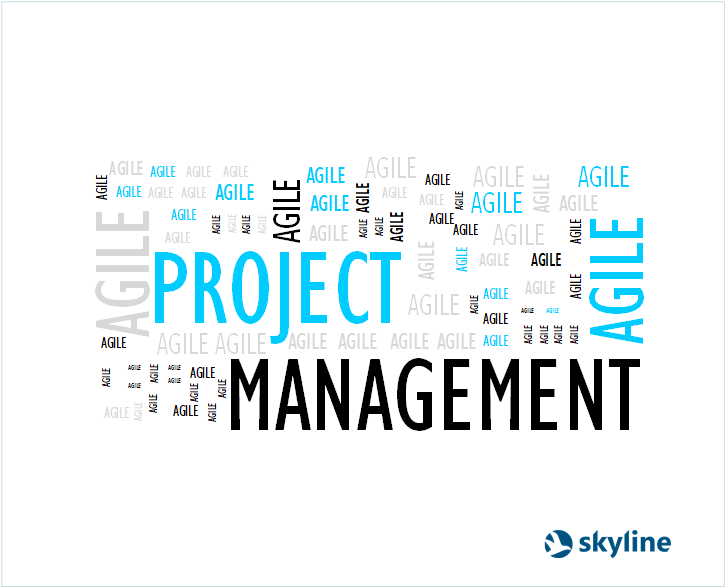Everybody is aware that the agile way of working is here, and it’s here to stay. I was thinking, how does that affect the traditional role of a project manager?

In the old-fashioned way of working, project managers had a lot of responsibility. They were responsible for managing scope, cost, quality, recourses, communication, delivery, risk, procurement, and much more.
Now, getting work done no longer needs to involve any disciplined approaches. It is more manageable for a team to self-organize the most productive way of working. A project manager is no longer a position that is simply about delivery. A product owner has a task and responsibility for the overall success of product delivery, so then I started asking myself: is a product a project?
A project is a time-based activity, with a clear definition of what needs to be delivered and a product intends to evolve and iterates creating new values to the customers continually.
Acknowledging the new challenging position of an agile project manager, here are some of my personal views on the essential roles and responsibility.
Decision making
It took me a while to embrace the fact that day-to-day routines and operational decision making is now totally removed from the product manager role, and it’s the sole responsibility of the product owner. Quickly, I realized that by using this approach, everything moves faster, and there is no longer a bottleneck in daily work.
On the other hand, strategic decisions related to customer, projects or programs is still the responsibility of the agile project manager. The product manager needs to be able to see the bigger picture and has to connect the strategic goals of the organization, sharing this frequently with the team.
Emergency decision-making situation that comes from escalation needs to be facilitated by the project manager involving the right level of the management and the team.
Project timeline
Completing work on time will always be one of the principal responsibilities for agile project managers. The timeline of the project delivery needs to be aligned with the product roadmap and include all milestones, not just product increment and version releases. The timeline needs to be updated more frequently, perhaps even on a weekly basis, and has to be communicated to all the stakeholders.
Project commercial management
One role that didn’t change is that an agile project manager’s responsibility is to manage the entire commercial agreement of the project.
Besides the administrations, and reporting to management and stakeholders, the project manager is the one who’s responsible to make sure the scoped work doesn’t exceed the agreed commercial value and the spot doesn’t change along the way.
Managing the Risk
Every project faces the risk of encountering something unexpected that perhaps can lead to an additional cost and temporary or even permanent project closure. The agile project manager’s responsibility is to identify, evaluate and communicate the project’s risks to the stakeholders, and to work together with the team to minimize their impact.
Reporting
Stakeholders will need to know more than the sprint goal results. The project manager’s role is to assist the team in establishing and collecting metrics that will be used in reporting. Scrum teams can be even leerier of metrics agendas than traditional teams, so this is an area where the agile project manager should proceed cautiously. One thing an agile product manager should collect is information on how much value teams are delivering.
Communication
Clear, open and partnership level communication with the customer is one of the vital aspects for successful project delivery. The product manager needs to facilitate this kind of communication environment to help the product owner and stakeholders. When a conflict arises, an agile project manager will need to step in to avoid the conflict from bothering the customer or try to resolve the conflict by competing and compromising.
Change Management In Everything
Change management used to be the domain of the change manager, but today, many organizations don’t have that luxury. Every project delivers change, and change management is now a new role for an agile project manager. The agile product manager needs to work closely with the customer, helping them to implement a change that the project will bring.
All of the above are valid statements, but of course, they can variate depending on the project size, product complexity and how the team is organized. Having a project manager in the agile team will bring more benefits to the product and project, increasing efficiency, having better customer satisfaction and also a stronger strategic alignment with the customer.
I would like to hear your opinion, which you can post in the comments about the role of the project manager in an agile team.
Always inspiring to read your blog posts Dean, thanks!
Thanks, Jordy.
The agile project manager is like the old project manager on stereoids!!
While a project manager (scope based) was solely responsible for the proper executing, time management and orchestrated change management, he’s today in the Agile world a real ‘program manager’. And that’s a pretty awesome place to be. Whether it’s one body or different bodies being the BPO (Business Program Owner) and the TPO (Technical Program Owner), it does mean that for every user-story in the backlog there is a decision on the prioritization of the actual execution based on the ‘cost of delay’ (e.g. the cost of not doing it) divided by the estimated effort (calculated by the TPO), the so-called ROI. In other words, as an Agile program manager you’re playing a pivotal role on the user-requests coming from the customer, the decision to actual do it/or not and the actual deployment technicalities in a fully transparent way with the customer – how much more empowered you can be!!
Indeed, always inspiring to read your blog posts Dean!
Great blog post Dean! Very enlightening!